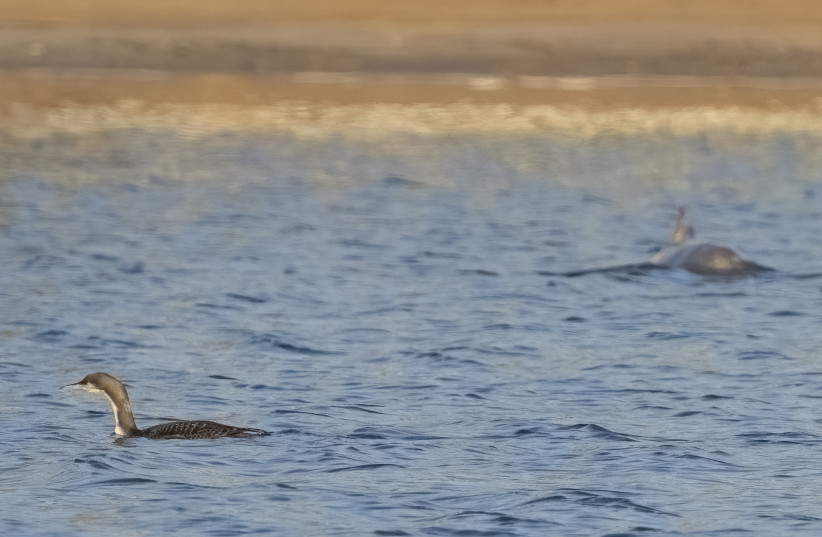While 2023 will be remembered as a particularly difficult year for Israel, it ended on a positive note for Israel's ornithologists, who received happy news about a rare guest that arrived in Eilat from Alaska - a Pacific diver bird.
Last week, Moshe Naaman, a young volunteer from the Nili and David Jerusalem Bird Observatory, found the special bird at the Peace Lagoon while visiting Eilat. He was there to take part in a community event held for evacuees from Sderot, organized by the Society for the Protection of Nature in Israel (SPNI) and the Eilat Ornithological Center.
Dr. Yoav Perlman, director of the Israel Ornithological Center (IOC) at the SPNI, arrived at the site to watch the diver, also referred to as loons. To his surprise, it did not look like the two diver species observed earlier in Israel – a black-throated one and a red-throated one – but rather a Pacific diver, which breeds in the North Pacific Ocean, Northwest North America, and Northeast Asia.
According to Perlman, this is the first sighting of a Pacific diver in Israel – and in fact the entire Middle East.
"All species of divers are very rare in Israel, with only a few sightings of the species. It is very exciting to find a new species in Israel. Kudos to Moshe Naaman who found the diver,” he said.

“Going out into nature and bird watching helps me deal with the complex situation today," Perlman said. "Watching the diver, and going out to see birds, are for me a tool for healing and recovery.
"We at the Society for the Protection of Nature are working even harder to use nature as a tool for healing and recovery, literally [reversing its name:] 'nature for the protection of society.' I recommend that we all go out into the Israeli nature, take care of it, and enjoy what it can give us," he said.
SPNI explained that the diver genus is a group of birds that spend most of their lives at sea, except for a few months when they come to nest in lakes in the Arctic Circle. They are named for their special diving skills, which allow them to swim quickly and spend a long time underwater, to capture their food, which mainly consists of fish and crabs.
Noam Weiss, director of the Eilat Ornithological Center and a senior birder at the society's IOC, says that after the initial announcement from the field, dozens of birders and ornithologists came to the Peace Lagoon, first from Eilat and later from all parts of the country, to watch the special event. Eilat was and remains the ornithological capital of Israel.
Protecting bird habitats in Eilat
The combination of the desert, the sea and rich habitats attracts a large variety of bird species, some of which are very rare. On normal days, many seagulls and cormorants feed on the abundance of fish here, and this is the only site in Israel where the herring gull has nested, which also feeds on fish. In the last two years, a bottlenose dolphin has also been coming to the lagoon – a very rare marine mammal as well, Weiss explained.
The Peace Lagoon is just one of Eilat's magical breeding grounds. The Eilat Ornithological Center maintains additional habitats that serve as a magnet for many special bird species. Together with the salt factory of Eilat "Salt of the Land," the flamingo ponds have also become an attraction for many birds, including about 1,000 flamingos, and for many visitors.
The Moshavim water reservoir, managed by the Ein Netafim water corporation, is undergoing significant improvement for the benefit of the birds with the help of the Fund for Open Areas and the Arava Drainage Authority. Kibbutz Naut Smadar, with the assistance of SPNI and the Environmental Protection Ministry, is removing hazards and taking advantage of opportunities to make the kibbutz areas more bird-friendly.
"Unfortunately, Eilat's magical lagoon will become a tourist and hotel site in a few years, and the birds will probably have to look elsewhere," Weiss concluded. "The Society for the Protection of Nature and the Eilat Ornithological Center are working on alternatives in the form of various creative projects to allow Eilat to remain a magnet for migratory birds and to [be the] center a thriving nature and bird tourism."
The Environment and Climate Change portal is produced in cooperation with the Goldman Sonnenfeldt School of Sustainability and Climate Change at Ben-Gurion University of the Negev. The Jerusalem Post maintains all editorial decisions related to the content.
